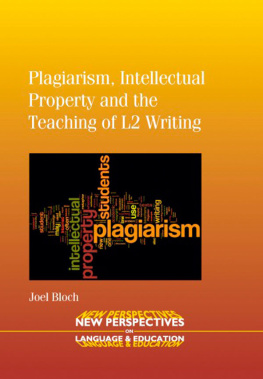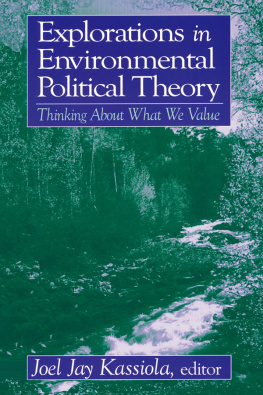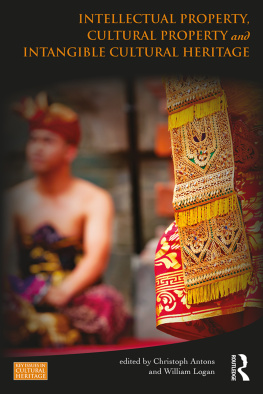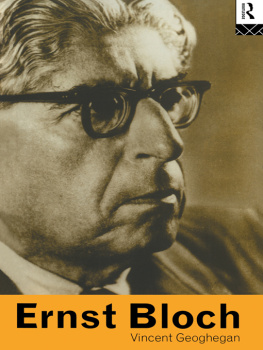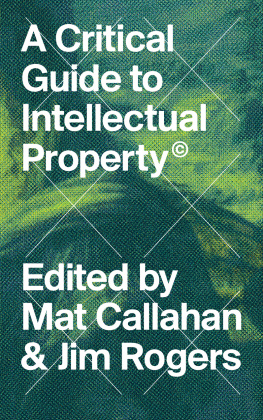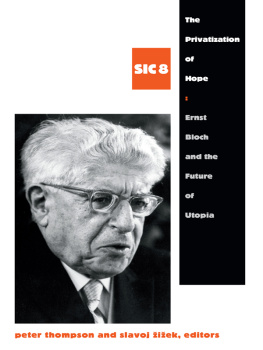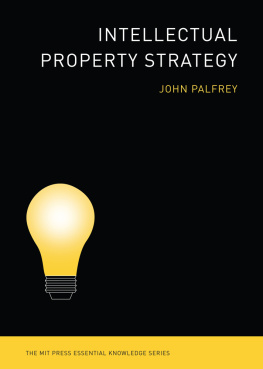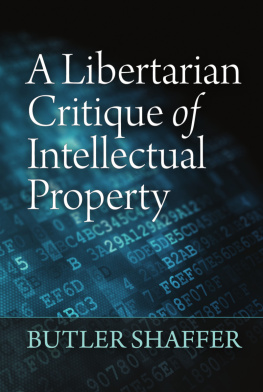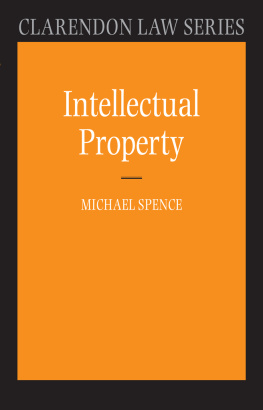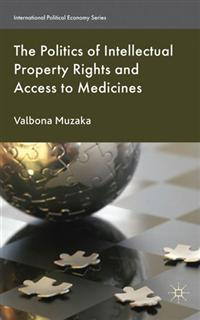NEW PERSPECTIVES ON LANGUAGE AND EDUCATION
Series Editor: Professor Viv Edwards, University of Reading, Reading Great Britain
Series Advisor: Professor Allan Luke, Queensland University of Technology, Brisbane, Australia
Two decades of research and development in language and literacy education have yielded a broad, multidisciplinary focus. Yet education systems face constant economic and technological change, with attendant issues of identity and power, community and culture. This series will feature critical and interpretive, disciplinary and multidisciplinary perspectives on teaching and learning, language and literacy in new times.
Full details of all the books in this series and of all our other publications can be found on http://www.multilingual-matters.com, or by writing to Multilingual Matters, St Nicholas House, 31-34 High Street, Bristol BS1 2AW, UK.
Plagiarism, Intellectual
Property and the Teaching
of L2 Writing
Joel Bloch
MULTILINGUAL MATTERS
Bristol Buffalo Toronto
This book is dedicated to Milton and Ida Bloch.
Library of Congress Cataloging in Publication Data
A catalog record for this book is available from the Library of Congress.
Bloch, Joel.
Plagiarism, Intellectual Property and the Teaching of L2 Writing/Joel Bloch.
New Perspectives on Language and Education: 24
Includes bibliographical references and index.
1. English languageStudy and teachingForeign speakersMoral and ethical aspects.
2. Plagiarism. 3. English teachersProfessional ethics.
I. Title.
PE1128.A2B54 2012
808.025dc23 2011048972
British Library Cataloguing in Publication Data
A catalogue entry for this book is available from the British Library.
ISBN-13: 978-1-84769-652-6 (hbk)
ISBN-13: 978-1-84769-651-9 (pbk)
Multilingual Matters
UK: St Nicholas House, 31-34 High Street, Bristol BS1 2AW, UK.
USA: UTP, 2250 Military Road, Tonawanda, NY 14150, USA.
Canada: UTP, 5201 Dufferin Street, North York, Ontario M3H 5T8, Canada.
Copyright 2012 Joel Bloch.
All rights reserved. No part of this work may be reproduced in any form or by any means without permission in writing from the publisher.
The policy of Multilingual Matters/Channel View Publications is to use papers that are natural, renewable and recyclable products, made from wood grown in sustainable forests. In the manufacturing process of our books, and to further support our policy, preference is given to printers that have FSC and PEFC Chain of Custody certification. The FSC and/or PEFC logos will appear on those books where full certification has been granted to the printer concerned.
Typeset by Datapage International Limited.
Printed and bound in Great Britain by Short Run Press Ltd.
Contents
Acknowledgments
I would like to thank Anna Roderick and the staff at Multilingual Matters, the Center for the Study of Teaching and Writing at The Ohio State University for their financial support, and Lan, Hannah and Moonlight for their moral support.
1 The Problem of Plagiarism
Art comes not out of the void, but chaos
Mary Shelley
The great French filmmaker Ren Clair was once asked whether Charlie Chaplin had plagiarized one of his films, A Nous la Liberte, in the making of Modern Times. Clair responded that if Chaplin had plagiarized him, he would have been honored. As Clairs response indicates, the definition of what is considered plagiarism and its effect on the creative process can be vague, inconsistent, confusing and highly contested. For writing teachers, the problem of plagiarism has emerged as one of the central pedagogical issues while, at the same time, presenting a unique opportunity for instruction.
Plagiarism refers to the inappropriate use of what is called intellectual property. In the United States, intellectual property is defined as creative acts that have been placed in a fixed medium. Intellectual property differs from physical property in that, with often complex restrictions, it can be borrowed, distributed and utilized without seeking the permission of the owner, something that would be a clear violation of the law in regard to physical property. Intellectual property is often given a fixed limit of protection, which is rarely true for physical property. Ideas, on the other hand, are not considered intellectual property unless they are placed in a fixed medium. Boyle (1996) argues that this concern for separating the idea and its expression is deeply rooted in concepts related to free speech: that the ability to express an idea should not be hampered by claims of ownership.
The use of intellectual property, both inside and outside the classroom, is governed by a myriad of often highly contested legal and ethical rules. Today, there has been much concern about violations of these rules, what are sometimes termed as the plagiarism epidemic or the piracy epidemic (Lessing, 2004, 2006). As will be discussed in more detail later, there is no general agreement as to whether such epidemics exist and, if they do, how they should be dealt with. Nevertheless, a variety of high-profile plagiarism scandals have permeated the news throughout the world. A study at an American university estimated that 18% of students plagiarize at some time, which increases to 31% for students scoring in the lower 25th percentile of the Student Aptitude Test (SAT), which many students need to take in order to enter university (Dee & Jacob, 2010). A poll at Cambridge University in Britain found that 49% of students admitted to cheating while only 5% admitted to having been caught (Sugden, 2008).
Surveys across universities often report similar estimates of presence of plagiarism; however, these estimates are not always matched by the number of students formally accused of plagiarism. In a survey of undergraduates in online courses in the United Kingdom, Selwyn (2008) found that more than 60% reported some instances of plagiarism. In the 20092010 school year, the Ohio State University, which has about 60,000 students, received 174 complaints of plagiarism (Coleman & Curry, 2010). The relatively low number may have resulted from the difficulty in identifying plagiarism or from the reluctance of instructors to involve themselves in the consequences of sending students to the academic misconduct committee (Curry, personal communication). The internet has often been cited as one of the key causes of this upsurge (see Howard, 2007). In a recent survey of teenagers in the United States, 36% reported using the internet for plagiarizing (The Ethics, 2008).
This concern has not been limited to the West. Reports of cheating at Chinese college entrance exams have been widespread (Wong, 2009). A UNESCO publication entitled Corrupt Schools, Corrupt Universities: What Can Be Done? (Hallak & Poisson, 2007) argues that plagiarism, as well as similar forms of academic corruption, is a worldwide phenomenon that involves people from a wide variety of backgrounds, including students, academics, journalists and politicians.
The growth of such reports has coincided with the growing Westernization of academic life throughout the world, particularly in areas such as publishing (Lillis & Curry, 2010), which has sometimes led to an importation of Western-style rhetoric regarding plagiarism. Often the rhetoric attached to plagiarism in non-Western cultures is also attached to the discussion of intellectual property. In many developing countries, there has been a pragmatic dimension to the concern over plagiarism, often viewing plagiarism as a threat to the credibility of the research rather than as a threat to academic integrity. A survey of the Higher Education Commission in Pakistan, for example, found that the fear of plagiarism has greatly hampered research at universities across Pakistan (Lodhi, 2010).

